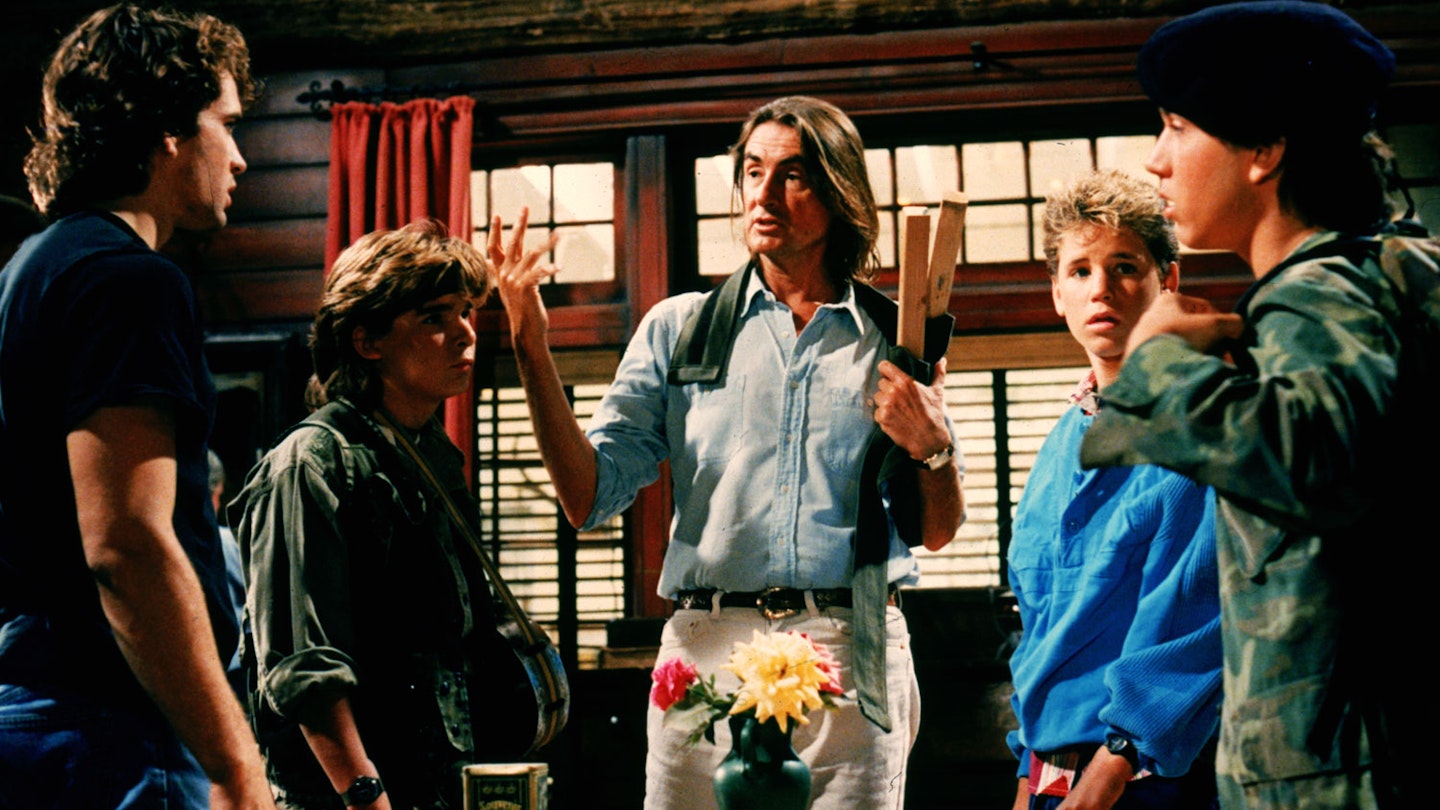Among his greatest works, Joel Schumacher's The Lost Boys remains perhaps the director's most beloved movie – a ripping, raucous vampire horror-comedy that forever changed the way we see bloodsuckers on screen. In December 2019, Empire spoke to Schumacher to get the full story on how he turned a squeaky-clean Goonies-esque adventure story into the coolest, sexiest vampire film ever made – published in the April 2020 issue. As Halloween approaches – and the film tops our list of the Best Vampire Movies – read the original feature below to find out how he did it.
The Lost Boys was an unholy production: an organic, ever-evolving beast held together by hard graft, extreme partying, some of the most beautiful young actors New Hollywood had to offer and an obscene amount of talent. This was not your dad’s Dracula — this was sexed-up vampires, maggot hallucinations and death by stereo, lensed by the cinematographer of Taxi Driver, brought to life by the director of hot young graduates drama St Elmo’s Fire.
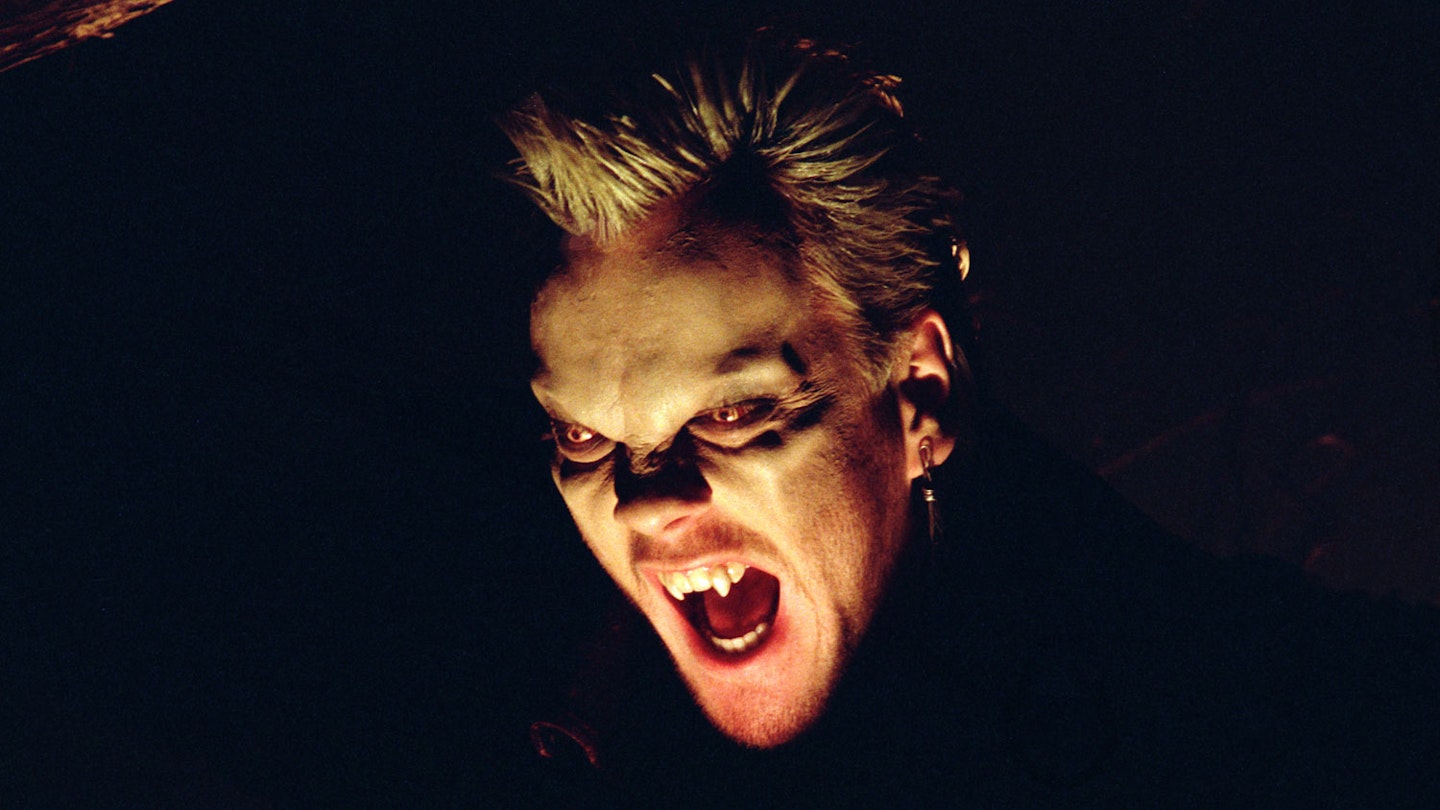
“Warner Bros. took a big chance with this movie, and with me, because they really didn’t know what the heck I was doing,” chuckles a now 80-year-old Joel Schumacher, by his fireplace at home in New York, The Lost Boys on the TV for reference. Well, it has been 33 years. In that time, though, adoration for it has only grown. And while the film wasn’t quite forged in the fires of hell, it was certainly bedevilled.
James Jeremias was a first-time screenwriter, working as a grip on studio lots when he had the idea for The Lost Boys. “I had read Anne Rice’s Interview With The Vampire,” he says, “and in that there was a 200-year-old vampire trapped in the body of a 12-year-old girl. Since Peter Pan had been one of my all-time favourite stories, I thought, ‘What if the reason Peter Pan came out at night and never grew up and could fly was because he was a vampire?’”
So was born ‘Lost Boys’, back then without a ‘The’, referencing Peter Pan’s kiddy gang. The screenplay, which Jeremias wrote in the summer of 1984 with childhood friend Jan Fischer, concerned two young brothers living in Santa Cruz with their divorced mother. There they meet the leader of a vampire gang before connecting with the Frog brothers, identical twin eight-year-old vampire-hunting boy scouts. All of the kids were pre-teens. “It was about that time in life before sex rears its ugly little head,” says Jeremias. That would soon change.
Jeremias and Fischer’s agent sent the script out and they sold it, in January 1985, to a company called Producer Sales Organization (PSO), who had a deal with Warner Bros., for a whopping $400,000. PSO then went bankrupt, and Warner Bros. hired Richard Donner, fresh off his Goonies success, to direct it. Donner liked it but wanted the Peter Pan references jettisoned. “He wanted to make the boys older,” says Jeremias. “He said, ‘Old enough to drive,’ but what he meant was, ‘Old enough to fuck.’”
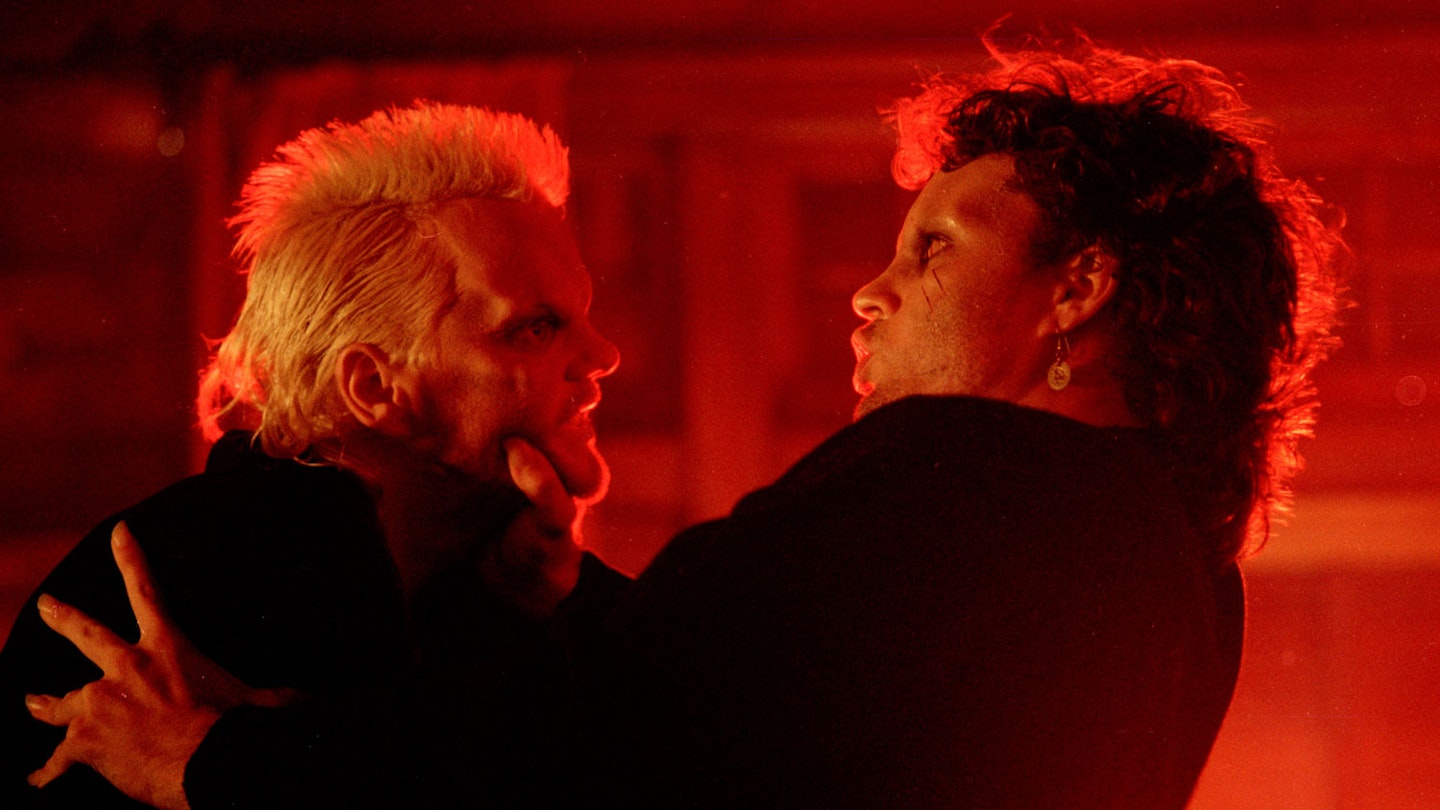
Donner wanted them to write a third draft with him, but by that point Jeremias and Fischer were unavailable, writing a screenplay for Paramount, so Donner instead hired Jeffrey Boam, who had written David Cronenberg’s The Dead Zone. Then, though, Donner was offered Lethal Weapon and, enthusiastically responding to a fully formed screenplay, jumped onto that, staying on Lost Boys as executive producer.
Donner’s wife, producer Lauren Shuler, had just produced Schumacher’s St. Elmo’s Fire, and said he’d be perfect for it. At a lunch meeting, however, over Bloody Marys with Warner Bros. executive Mark Canton, Schumacher was sniffy. “I was such an asshole,” he recalls. “I’d only made three movies, and I said, ‘Are you offering me some kids’ vampire movie?’ Mark swallowed the words that were probably, ‘Will you shut the fuck up? You’re lucky we’re asking you,’ and he said, ‘Well, would you do me the honour of reading it?’ It was so humbling. I said, ‘Mark, I’m so sorry. It’s probably the Bloody Mary.’”
Schumacher read the original draft. “It was very much ‘Goonies Go Vampire’, he says. “Charming and adorable, and very G-rated, the farthest thing that could be in my consciousness.” He was going to turn it down, but then went for a run and a wave of ideas hit him. Instead of a cave, he thought that the vampires could live in an old Victorian hotel that had crumbled into the San Andreas Fault during the 1906 earthquake. They should be in their late teens, and look like “a British gypsy band”, riding stripped-down motorcycles. With cylinders firing, and the greenlight to reconfigure it all with Boam, he took the job.
"We all just opened up to the experience, we embraced it. Which is the only way to make a movie. Don’t hold back.”
“I wanted to make a movie that I would want to see,” Schumacher says. The whole vampire thing was, he believed, an oral-sex metaphor anyway. “Dracula dresses in dinner clothes,” he explains. “Quite elegant. And he appears at the windows of beautiful young women, where he systematically sucks the fluid from their body, making them his slaves. What else could it be a metaphor for? And vampires can be gorgeous.”
He wanted his vampires to be sexy, he says. With Kiefer Sutherland (as vampire leader David) and Jason Patric (as new guy Michael, whom the gang ensnares) going toe to toe, surrounded by the likes of Billy Wirth’s shirtless vampire beefcake, the film wouldn’t be short of eye-candy. “I thought, ‘I’m gonna put him in a motorcycle jacket with no shirt on, and he is gonna be a fabulous Lost Boy,’” says Schumacher of Wirth. Patric suggested Jami Gertz for female vampire Star. “I think he had a big crush on her,” says Schumacher. “Well, who didn’t?” These actors weren’t cast because they were pretty, but it didn’t do any harm, the director maintains. “I’ve been accused by journalists, right to my face, of objectifying men and women sexually,” he laughs. “And I say, ‘Do you have a problem with that? What’s the bad part?! Why is that so terrible?’”
Costume designer Susan Becker, meanwhile, dressed the vampires in a mélange of clothes from different eras, hinting at their agelessness. Make-up artist Ve Neill made their nails look like razor-blades, for effective throat-slashing. Sutherland had his hair cut on the sly, inspired by Billy Idol’s peroxide spikes, which enraged Schumacher at first, but he came around to it. “We all just opened up to the experience, we embraced it,” he says. “Which is the only way to make a movie. Don’t hold back.”
The studio wanted to hold back — just before shooting, they got “cold feet”, claims Schumacher, concerned that the cast were mostly unknowns, and ordered a budget cut of $2 million. Most of it came out of the art department, which meant production designer Bo Welch had to be even more creative, and corners were cut ingeniously. A POV shot of a vampire shooting through the clouds ended up being unused B-roll footage Schumacher managed to wangle from Top Gun. What’s more, the execs couldn’t understand what sort of film he was making. When they asked if it was a horror or a comedy, he said, “Yes.”
Certain execs were also squirmy about the genre element. “There was a bit of a shame factor at Warner Bros.,” says Schumacher. “People in marketing would say, ‘Well, it’s not really a vampire movie, Joel, it’s really an alienation movie, it’s about the disenfranchised.’ And I said, ‘No. We absolutely are making a teenage vampire movie. Our job is to make the coolest vampire movie ever made.’” And so they did.
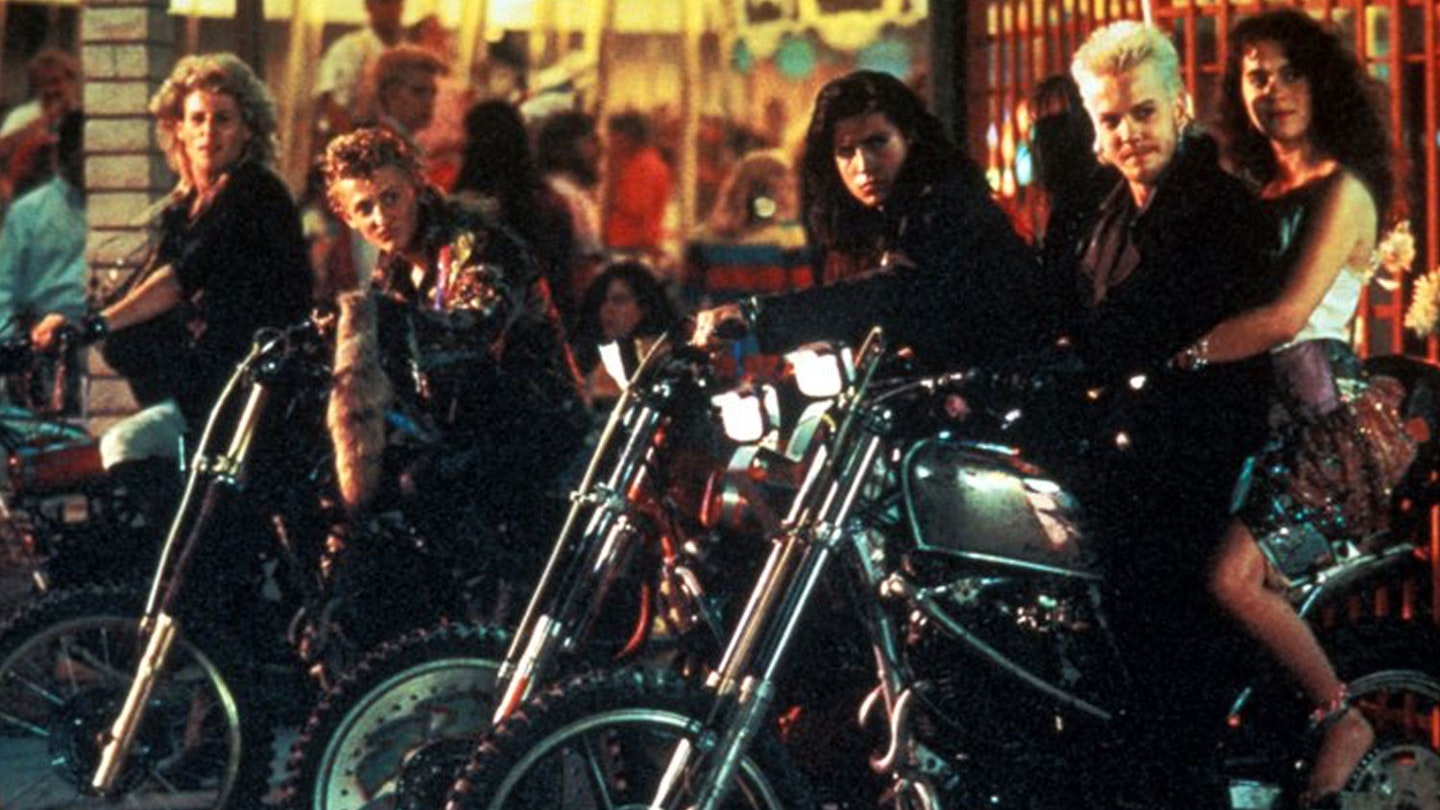
Shooting began in Santa Cruz on 2 June 1986. “When I got there I thought, ‘This is exactly where you would go if you were a teenage vampire,’” Schumacher says. “Because you’ve got the boardwalk, the beach, a lot of transient young people, a lot of drug people, and runaway kids all over the place. Santa Cruz had more murders per capita than anywhere else in the United States. There was a murder outside of our hotel while we were preparing the movie.” The Santa Cruz authorities welcomed the crew, but didn’t want to scare any more tourists away, so the town’s on-screen name was changed to Santa Carla.
Shooting the boardwalk concert there, for the sequence in which Michael meets the vampires, was “a riot”, according to Schumacher, hundreds of onlookers partying while topless saxophonist Tim Cappello gyrated on stage. The place stunk of pot. People clambered onto the stage, only to be shoved off by cinematographer Michael Chapman, who didn’t want his shot ruined. And the partying in the nearby Santa Cruz Holiday Inn, where almost all of the cast and crew were shacked up, was just as riotous. Alex Winter, who played vampire Marko, has described it as a rave, with “crazy shit” going on in every room. Schumacher’s lips are sealed. “Take a bunch of 13-year-olds and a bunch of 18-year-olds and put them in a hotel,” he says. “Of course there had to be chaperones for the 13-year-olds, but... anyway, I’m not going to say another word.”
An electricity rippled through the cast, with some of the on-screen dynamics mirrored on set. Sutherland was a natural born partier, instinctively becoming the leader of the lost boys off-camera, and unwittingly influencing his outfit when, showing off for a young lady who caught his eye during the first night of the shoot, he lost control of the dirt bike on the beach, crashing. With his left wrist badly broken, Schumacher just put him in black gloves for the production.
Meanwhile, 20-year-old Jason Patric played big brother to his on-screen little brother, the 14-year-old Corey Haim, whose life was “difficult”, says Schumacher. “He came from a home life that I would not have chosen to come from. He needed a big brother, and Jason was so wonderful with him. I think their affection for each other shows up on film.” The 14-year-old Corey Feldman, who played vampire hunter Edgar Frog, also had problems, and has spoken of this being a painful time in his life. In Paul Davis’ exhaustive book about the film, Lost In The Shadows, Feldman talks remorsefully of messing up on set one day because he’d been using cocaine the night before. Schumacher doesn’t remember this, but spoke with him on set. “I didn’t scream at him because I know first-hand what a disease that is,” he says. “Corey Feldman really made it through. God bless him.” Haim, tragically, did not, dying in 2010 at just 38 years old.
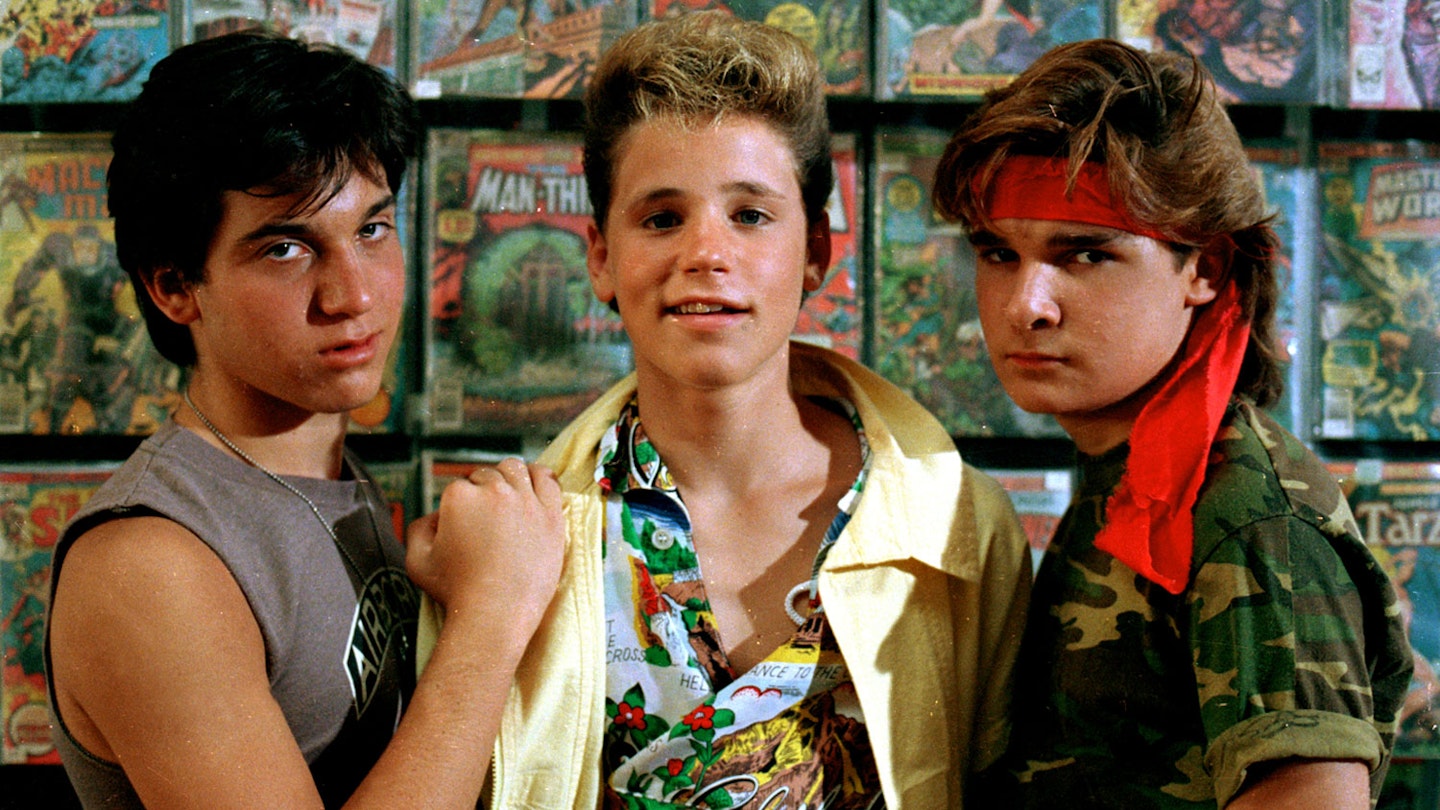
“There were some troubled youths on the film,” says Schumacher. “So maybe a troubled director was perfect!” The director was, though, on good form throughout the shoot, bar some volume. He was, said Jason Patric, “a bit of a screamer at times.” Schumacher takes the stand. “We had huge sets,” he says. “I had to yell at the top of my lungs, I wasn’t just screaming at everyone making the movie, the crew would have quit! But of course, a lot of times I had to shout. We were making stuff up as we went along. Everybody has their ‘I got shouted at by Joel Schumacher’ story. Guilty!”
There were some hairy moments. During the climactic scene in which Brooke McCarter’s vampire Paul attacks the Frog brothers in the bathroom, McCarter couldn’t get it right, not being frightening enough when he burst into the room. “His character was a real skateboard surfer,” says Schumacher, “and I think Brooke was... deep in the role, let’s say.” Chapman was running around with a huge Panavision camera on his shoulder, time was short because of the legal constrictions for child actors, and things got… heated.
“I was so frustrated, and I just slapped him and pushed the door in front of him,” says Schumacher of McCarter. “I’d never done it in my life, and never again. I’m ashamed of it. It’s outrageous — he should have reported me, I should have been up on charges. But I’ve apologised many, many times.” For the next take, McCarter was terrifying.
Patric had also been furious. He’d hesitated about signing up in the first place, concerned that it would be an exploitation film, but had been promised by Schumacher that he wouldn’t have to wear monster make-up. Now, though, the ending had been rewritten and, having to fully vamp out to attack David, Patric was indeed required to endure prosthetics. “I felt terrible,” says Schumacher. “I don’t lie to actors.” But things had changed. An enraged Patric refused to do it, complaining to his manager that he’d been lied to, and told Schumacher he wouldn’t come to work. Finally, he was encouraged to return by Warner Bros., and put in an appropriately aggressive performance. The Lost Boys was in the can.
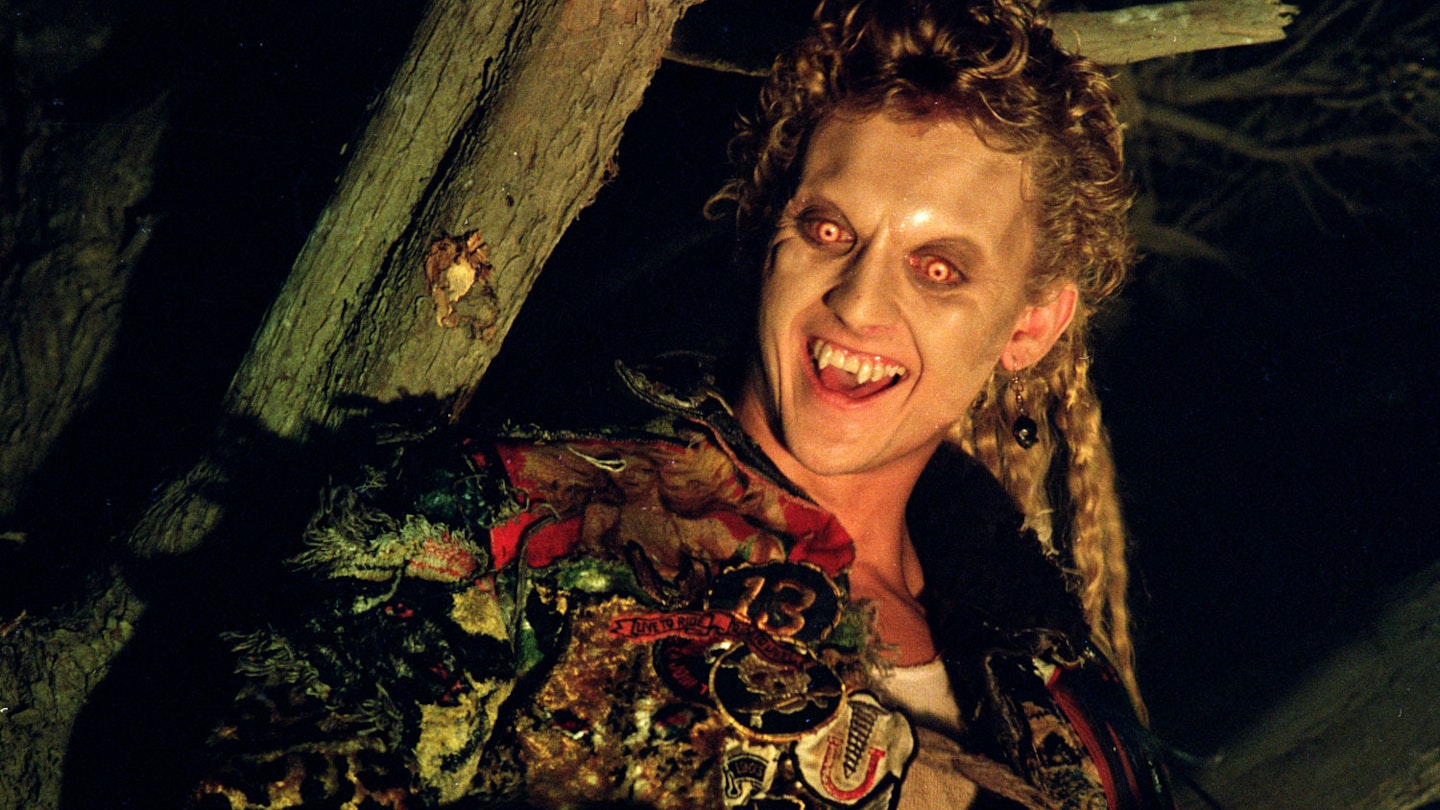
Schumacher knew the film had worked when, at the first test screening, some “surf punks” in the cinema got so excited during the scene in which the vampires carry out a violent beach massacre, they tore up the cinema seats and threw the stuffing around. “They were screaming and yelling. That screening was a rock concert, it was balls out,” says the director. “I wasn’t ready for it. And you never saw so many happy executives in your whole life. And from then on there was this sort of drumbeat about Lost Boys.”
The film did well enough, making $32 million from an $8.5 million budget, but became a huge success on video. Warner Bros. and Donner wanted a sequel, and Schumacher suggested a prequel, introducing the Lost Boys in a story set around the 1906 earthquake — “I said you could have horses, it could be quite exciting” — or a female version, ‘The Lost Girls’, starring, he suggested, “Drew Barrymore and Rosanna Arquette on motorcycles. I wanna see that movie!” Plans faded away, though; two Feldman-starring sequels were made years later, but were less inspired, straight-to-DVD situations.
Yet the drumbeat continues. Joss Whedon has cited the film as influencing Buffy The Vampire Slayer; the lust-soaked Twilight films owe a debt; and many of today’s filmmakers speak highly of it. Recently, Jordan Peele referenced it at the start of Us, in the 1986-set prologue on the Santa Cruz boardwalk, in which Adelaide’s mother says, “They’re shooting a movie over there by the carousel.” Schumacher grinned as he watched it. “He gives us the nod!” he says. “A subtle little shout-out, but I loved it!” Meanwhile, US network The CW is currently developing a pilot for a new Lost Boys series.
James Jeremias is “really happy” with what his original script spawned. He wrote more screenplays, but none made it into production, and he went back to being a grip before retiring. “They made a really good film,” he says of The Lost Boys. “It worked out!” Looking back, Schumacher remembers it all with enormous affection. “There was nothing but the future ahead of all of us, whether the movie succeeded or not,” he says. “One day the two Coreys came to me and said, ‘Is this movie gonna be a hit, Joel?’ I said, ‘No-one knows if the movie’s gonna be a hit, guys. So we have to enjoy the heck out of it now. We’re a family, and we get to make a movie on Warner Bros.’ money, and we’re gonna enjoy the heck out of it. And whatever happens is not up to us, it’s up to the gods. So let’s party on.’”
And they did. The film’s tagline — “Sleep all day. Party all night. Never grow old. Never die” — is as fitting as it gets, reflecting everything that went on, and immortalising its cast. Never die.
